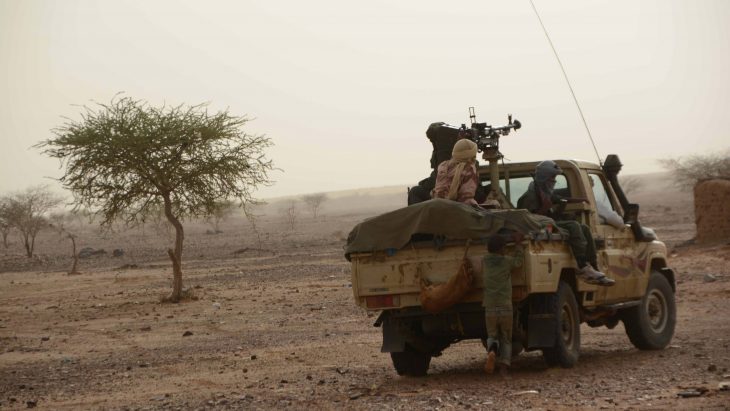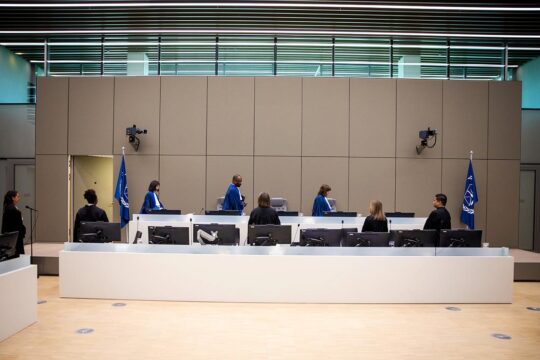Atrocities that may classify as war crimes were committed in northern Mali in May 2014 and May 2015 by armed groups and Malian security forces, according to two UN reports published in December. The armed groups reject these accusations.
The UN reports come as the Malian government and armed groups close to Bamako are struggling to advance the application of a peace accord signed last June. This agreement, fruit of long negotiations led by Algeria, aims to restore sustainable peace to northern Mali, which has seen repeated Touareg uprisings since independence from France in 1960.
The two reports, published jointly by the UN force in Mali (MINUSMA) and the office of the UN High Commissioner for Human Rights, are based on interviews with 230 people including victims, witnesses and parties to the events in Kidal. They were carried out during 65 missions to the regions of Kidal, Gao and Timbuktu in the north, and to the capital Bamako.
Crimes in Kidal
The first report documents human rights abuses and violations of international humanitarian law committed in Kidal between May 16 and May 21, 2014, by various armed groups and by the Malian security forces. Abuses committed by the National Movement for the Liberation of Azawad (MNLA), the High Council for the Unity of Azawad (HCUA) and the Arab Movement of Azawad (MAA) include the killing of eight people including six members of the Malian administration, according to the report. Some of the victims were subject to summary execution, it says.
The report accuses these Touareg and Arab rebel groups of recruiting child soldiers and using them to fight, carrying out illegal arrests and detentions, of cruel, inhuman and degrading treatment, looting and destruction of property. As for the Malian Armed Forces
(FAMA), the UN says they used heavy artillery indiscriminately in Kidal, firing towards civilian-populated areas. The report says these acts could be classified as war crimes if this is confirmed by a competent court.
The UN report stresses that “almost no measures have been taken by the Malian authorities and the armed groups to identify the perpetrators of these violations and abuses and hold them accountable for their acts”. A commission of inquiry has been set up by the Malian parliament but has not yet delivered its report.
Crimes in Gao region
The second report documents human rights abuses and grave violations of international humanitarian law perpetrated in the village of Tin Hama in Gao region on May 20 and 21, 2015, following clashes between armed elements of the Imghad and Allied Touareg Self-Defence Group (GATIA, close to the government) and the Coordination of Azawad Movements (CMA).
The report says that during this attack, GATIA elements summarily executed six men because of their ethnicity and supposed allegiance to the CMA. They are also accused of forcibly displacing 230 people on grounds of their ethnicity. The CMA is accused of holding three elements of the GATIA and of looting.
The report highlights the failure of the Malian armed forces to protect the population, which it says could constitute a failure of the State to meet its international obligations.
“The judicial authorities have not opened any investigation into the events in Tin Hama,” says the report. It urges the Malian authorities and all signatories to the peace agreement to live up to their obligations under human rights and international humanitarian law and their responsibility to protect civilians.
Justice for the victims
“It is by addressing the events in Tin Hama and Kidal, by ensuring justice for victims and putting an end to impunity, that the Malian authorities and the armed groups that are signatories of the Algiers Accord will truly demonstrate their engagement regarding human rights,” said UN High Commissioner for Human Rights Zeid Ra'ad Al Hussein. He said this was indispensable to tackle the underlying causes of the Malian crisis and put the country back on the path to peace and reconciliation.
But the armed groups deny all responsibility. In an interview with Studio Tamani, the CMA said it “categorically” rejected the accusations and called for “an independent, international inquiry”. It said it had “respected the obligatory norms” during the various clashes in the north.
GATIA also rejected the accusations, saying they “contradict other reports by competent bodies of the Monitoring and Implementation Committee of the Algiers Accord”.






